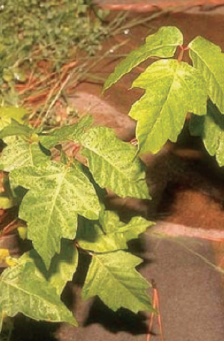
Can I NOT be allergic to poison ivy?
Poison ivy—along with poison oak and sumac—is a contact allergen based on the oils produced by the plant. Upon touching the green leafed flowering plant, the oily resin called urushiol causes a blistering, itchy eruption that spreads via the oil to all places touched. The eruption is often diagnosed because it can occur in a straight line across where someone touches the plant.
 Typically, the oil comes from the leaves and the rash may occur 12-48 hours after the exposure. The oil can leave a dark black resin which, if touched can spread. It happens by direct touch of plant, contaminated objects (including pets) or the burning of these plants. The fluid from poison ivy blisters is not contagious.
Typically, the oil comes from the leaves and the rash may occur 12-48 hours after the exposure. The oil can leave a dark black resin which, if touched can spread. It happens by direct touch of plant, contaminated objects (including pets) or the burning of these plants. The fluid from poison ivy blisters is not contagious.
Prevention is ideal and this is achieved by avoiding the plant, wearing protective clothing, removing the plants once identified, and washing your skin or pet’s skin after potential exposure. Barrier creams over the skin may also be beneficial. I think all people have some potential to be allergic to the urushiol, but the reaction will vary. Treatment includes washing the areas, calamine lotion and topical steroids. Wide spread of poison ivy may require oral or intramuscular injection of steroids.
HAVE A QUESTION FOR OUR DOCTORS? EMAIL US AT patient@sunflowerdermatology.com WITH SUBJECT LINE “Stump the Doctor”



I have been immune to poison icy since birth. I grew up in the country and once I was laying on a river bank waiting for my cousins to come out and play and my Uncle walked by and said “do you know you’re laying in a bed of poison ivy”. Since then I have pulled it up out of the ground with my bare hands and continue to do so thinking that I’m maintaining my immunity. I’ve never had the poison icy rash and I’m now 80 years old.